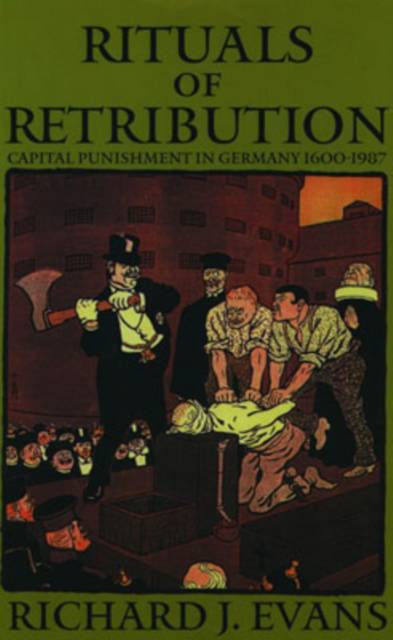
- Afhalen na 1 uur in een winkel met voorraad
- Gratis thuislevering in België vanaf € 30
- Ruim aanbod met 7 miljoen producten
- Afhalen na 1 uur in een winkel met voorraad
- Gratis thuislevering in België vanaf € 30
- Ruim aanbod met 7 miljoen producten
Zoeken
€ 524,45
+ 1048 punten
Omschrijving
The state has no greater power over its own citizens than that of killing them. This book examines the use of that supreme sanction in Germany, from the seventeenth century to the present. Richard Evans analyses the system of `traditional' capital punishments set out in German law, and the ritual practices and cultural readings associated with them by the time of the early modern period. He shows how this system was challenged by Enlightenment theories of punishment and broke down under the impact of secularization and social change in the first half of the nineteenth century. The abolition of the death penalty became a classic liberal case which triumphed, if only momentarily, in the 1848 Revolution. In Germany far more than anywhere else in Europe, capital punishment was identified with anti-liberal, authoritarian concepts of sovereignty. Its definitive reinstatement by Bismarck in the 1880s marked not only the defeat of liberalism but also coincided with the emergence of new, Social Darwinist attitudes towards criminality which gradually changed the terms of debate. The triumph of these attitudes under the Nazis laid the foundations for the massive expansion of
capital punishment which took place during Hitler's `Third Reich'. After the Second World War, the death penalty was abolished, largely as a result of a chance combination of circumstances, but continued to be used in the Stalinist system of justice in East Germany until its forced abandonment as a result of international pressure exerted in the regime in the 1970s and 1980s. This remarkable and disturbing book casts new light on the history of German attitudes to law, deviance, cruelty, suffering and death, illuminating many aspects of Germany's modern political development. Using sources ranging from folksongs and ballads to the newly released government papers from the former German Democratic Republic, Richard Evans scrutinizes the ideologies behind capital punishment and comments on interpretations of the history of punishment offered by writers such as Foucault and Elias. He has made a formidable contribution not only to scholarship on German history but also to the social theory of punishement, and to the current debate on the death penalty.
capital punishment which took place during Hitler's `Third Reich'. After the Second World War, the death penalty was abolished, largely as a result of a chance combination of circumstances, but continued to be used in the Stalinist system of justice in East Germany until its forced abandonment as a result of international pressure exerted in the regime in the 1970s and 1980s. This remarkable and disturbing book casts new light on the history of German attitudes to law, deviance, cruelty, suffering and death, illuminating many aspects of Germany's modern political development. Using sources ranging from folksongs and ballads to the newly released government papers from the former German Democratic Republic, Richard Evans scrutinizes the ideologies behind capital punishment and comments on interpretations of the history of punishment offered by writers such as Foucault and Elias. He has made a formidable contribution not only to scholarship on German history but also to the social theory of punishement, and to the current debate on the death penalty.
Specificaties
Betrokkenen
- Auteur(s):
- Uitgeverij:
Inhoud
- Aantal bladzijden:
- 1048
- Taal:
- Engels
Eigenschappen
- Productcode (EAN):
- 9780198219682
- Verschijningsdatum:
- 9/05/1996
- Uitvoering:
- Hardcover
- Formaat:
- Genaaid
- Afmetingen:
- 241 mm x 165 mm
- Gewicht:
- 1621 g

Alleen bij Standaard Boekhandel
+ 1048 punten op je klantenkaart van Standaard Boekhandel
Beoordelingen
We publiceren alleen reviews die voldoen aan de voorwaarden voor reviews. Bekijk onze voorwaarden voor reviews.











